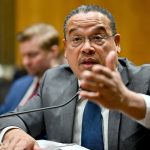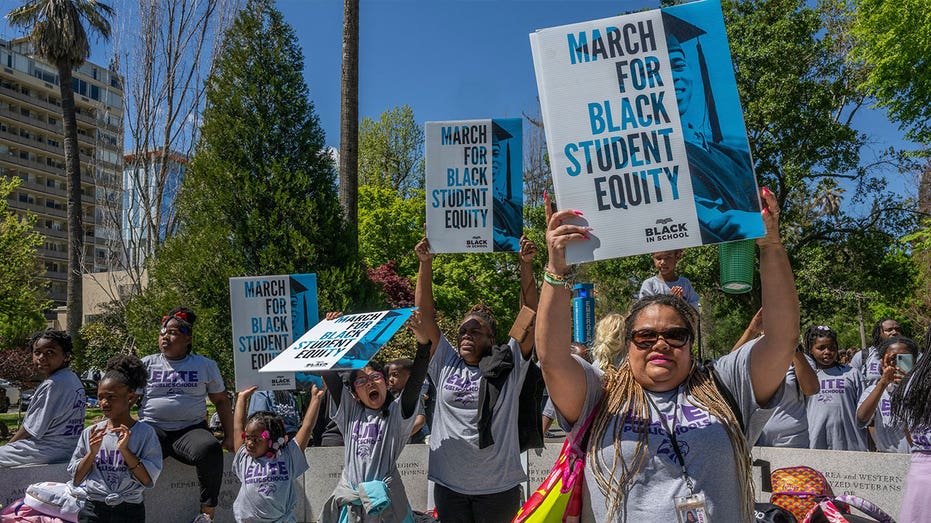The California Legislature is weighing a proposal by Gov. Gavin Newsom to set aside $300 million for low-income schools, but some education advocates say it won’t do enough to improve educational outcomes for Black students.
Assemblymember Akilah Weber, a Democrat from San Diego, introduced a bill last year aimed at ensuring more education money reaches Black students. But she pulled the bill after conversations with Newsom, citing concerns that it could violate the state or U.S. Constitution because it focused on one specific racial group, even though it didn’t specifically use the word “Black.”
Weber and other members of the Legislative Black Caucus worked with the Democratic governor to come up with the new approach that instead targets money to schools with a high concentration of students who qualify for free lunch under a federal program.
GOP SENATOR SAYS BIDEN’S DEPT. OF EDUCATION IMPOSING ‘DANGEROUS DELAYS’ ON SCHOOL SECURITY FUNDS
Weber called the proposal and guidelines to hold districts accountable for using money to improve student outcomes “game changers for closing persistent opportunity and outcome gaps in California.”
“This proposal is exactly what our state needs to work toward repairing the longstanding harms of inequity in education and ensuring our schools are more fair and accessible for all students,” she said in a statement.
While Newsom’s proposal is racking up support from Weber and other lawmakers, some advocates who backed Weber’s bill from last year say California must come up with a more targeted solution to benefit Black students. They are concerned about the stark disparity between Black students’ academic performance and that of their peers. The Black in School Coalition, which backed Weber’s prior bill, led a rally of thousands of advocates and students outside the Capitol on Tuesday following a legislative hearing on the new proposal.
The coalition wants the $300 million to be targeted at schools with a large portion of students who perform poorly on at least two of the following indicators outlined by the Department of Education: academic performance, chronic absenteeism, college or career advancement, English learner progress, graduation rate, and suspension rate.
“For 10 years, we’ve had a funding formula that has done nothing in particular for Black students, and it’s time for that to change,” said Margaret Fortune, CEO for a network of charter schools aimed at closing the achievement gap for Black students.
Fortune was referring to what is known as the Local Control Funding Formula, which dictates how school districts are funded.
The educator previously brought the issue to the state’s Reparations Task Force, a group studying how the state can atone for the legacy of slavery and policies that discriminated against African Americans.
About 70% of Black students failed to meet state testing standards for English Language Arts in the 2021-2022 school year, compared with less than 40% of white students, according to state data. About 84% of Black students didn’t meet math standards, compared with about 50% of white students.
Under Newsom’s proposal, the money would go to elementary and middle schools with at least 90%, of students qualifying for free meals under the program and high schools with at least 85% of students qualifying for free meals.
“Governor Newsom’s proposal is a monumental shift in California’s longstanding fight to close persistent achievement gaps and deliver on the promise of an equitable education for all students,” Izzy Gardon, a spokesperson from Newsom, said in a statement.
Students from majority-Black districts would also benefit from the accountability portion of Newsom’s budget proposal, which requires districts to implement strategies to improve academic outcomes, Gardon said.
LAW ENFORCEMENT ENHANCES SCHOOL SECURITY, TRAININGS AFTER WAVE OF COPYCAT SHOOTING THREATS
The proposal as it was originally written gives wide latitude to schools on how to spend the money but would require them to report how funds are used to the state.
Less than 26% of Black students attend a school that would qualify under the plan, CalMatters reported.
Tinsae Birhanu, a student and health ambassador for the Black Students of California United, said the state needs to do more to improve outcomes for Black students, including making sure the makeup of teachers is more diverse and combating high expulsion rates.
“Our education system should be nothing less than what we deserve,” Birhanu said.
At the budget subcommittee hearing, Assemblymember Kevin McCarty, a Democrat representing Sacramento suburbs and the committee’s chair, expressed his support for the proposal but noted that increasing funding for schools isn’t a cure-all for ending academic disparities.
“So much of these are outside of the classroom,” he said.
He noted other factors that contribute to poorer performance from students, including coming from a family that has experienced intergenerational poverty and is living in an under-resourced neighborhood.
Assemblymember Al Muratsuchi, a Democrat who represents the Los Angeles suburbs, questioned the Newsom administration during the hearing about how funding would be used to specifically benefit students and improve their performance in schools, such as by hiring literary coaches or tutors.
Representatives from Newsom’s administration didn’t have clear answers. Department of Finance officials said the proposal aims to ensure transparency in how the money is spent.
Newsom’s administration released its initial budget proposal in January. As the administration continues to testify before budget subcommittees, they can make changes to the language in the budget. They have until May to continue making changes, and the Legislature must pass a budget by June 15.
























